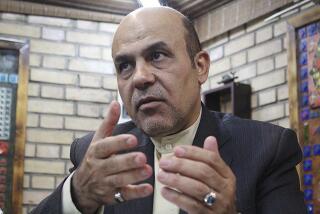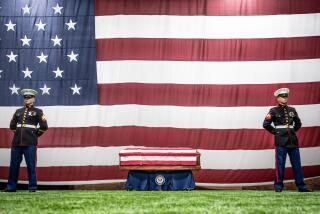Families of 2 GIs Killed by Fellow Soldier Describe Their Grief
- Share via
FT. BRAGG, N.C. — The families of two U.S. military officers killed in Kuwait by an American soldier gave emotional accounts Tuesday of life without their loved ones, as prosecutors wrapped up their case in the penalty phase of a court-martial seeking the death penalty for Army Sgt. Hasan Akbar.
Akbar, 34, was convicted last week of two counts of premeditated murder and three counts of attempted murder in a grenade and rifle attack that killed two and wounded 14 in an Army camp in Kuwait on March 23, 2003 -- two days before his unit moved into Iraq.
The 15-member military jury is expected to decide this week whether Akbar, who was raised in South Los Angeles, should be sentenced to death, life imprisonment without parole or life with the possibility of parole.
Akbar, a Muslim, has maintained that he believed U.S. soldiers were going to kill Muslim women and children in Iraq, and that in the weeks leading up to the war he was verbally attacked by soldiers who insulted his religion.
The government contends Akbar planned the assault and kept a computer diary of what he was going to do when the Army’s 101st Airborne Division deployed overseas.
According to testimony in the trial, Akbar shut off lights in the camp, threw grenades into tents where officers were sleeping and sprayed them with rifle fire as they fled.
Betty Lenzi, the mother of 40-year-old Air Force Maj. Greg Stone, testified Tuesday that her son had focused on a military career since watching the first moon landing on television. He joined the Reserve Officer Training Corps at Oregon State University and entered the Air Force as an officer. He was an air liaison officer with the 101st Airborne Division.
“He was my life,” she said of her son, who suffered 83 shrapnel wounds. “Now my life is gone.”
Recalling his burial at Arlington National Cemetery, she said: “I never got a chance to see him in his casket. I look up instead and hope someday he will come home. I know he won’t. But I hope he does.”
She said her son, who left two boys, “was the heart of our family. He was our hero. That grenade tore him away from us.”
Stone’s father, Richard Stone, said his grief remained unbearable.
“You go through the grieving process and get on with life,” he said. “But with Greg, there is not a day goes by I don’t think about him. There’s a broken link.”
Stone’s fiancee, Tammie Eslinger, described how a colonel told her of the grenade attack by a fellow American two days before the 101st was to enter Iraq.
“I was angry, livid,” she said. “Greg had worked his whole life to defend our country. When 9/11 happened, he was already in his uniform before I even got home.
“He fought to go to Iraq. That’s what he wanted to do before he retired. And I was so angry that he was right there, just about to realize his dream, and it was taken from him.”
The other officer killed was Army Capt. Christopher Seifert, 27, who was shot in the back.
“I just could not believe that an American soldier could do this,” said his mother, Helen Seifert. “It was betrayal.”
She said that since her son died, she had had a difficult time keeping her job and that her husband had developed a tumor.
“I still look for the phone to ring because he always called no matter where he was in the world,” she said.
Seifert’s widow, Terri, said their only child, Benjamin, 2, referred to his father as his “first friend.” She is proud to call herself an Army wife, she said, even though Akbar also wears the uniform.
“A sacred trust was broken that night,” she said. “That night that band of brothers was broken. And I am terribly lonely. I have a wonderful family and lots of friends, but I never knew you could be in a room filled with people and still feel alone.”
The defense is to open its case this morning.
More to Read
Sign up for Essential California
The most important California stories and recommendations in your inbox every morning.
You may occasionally receive promotional content from the Los Angeles Times.














